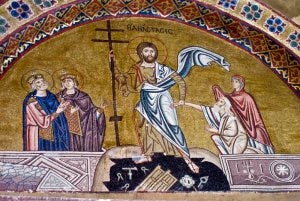Third Sunday of Easter: A Ghost Does Not Have Flesh and Bones
I imagine it was quite the surprise for Cleopas and his unnamed companion. They had just hustled back from Emmaus to tell the other disciples about Jesus, who spoke with them on the way and whom they recognized in the breaking of the bread. And then THERE HE IS, right in their midst, his earlier, sudden disappearance paired here with a sudden reappearance.
I would think I was seeing a ghost, too.
To prove he is not, Jesus shows his hands and his feet, the sites of his wounds. This passage from Luke does not say whether the wounds are still there the way that the Gospel of John does, but I suspect that it is implied. Cleopas knew it was Jesus in the breaking of the bread; here the disciples know it is Jesus in the suffering marked on his body.
In their surprise, Jesus continues to assert the fleshy reality of his appearance. He asks them for food, and the men he once called from their nets and boats here provide him fish to eat. Ghosts do not eat meals either, it seems.
In this appearance in the flesh, Christ again calls us to repentance and forgiveness. He says the disciples here are “witnesses of these things” – not only of his hands, his feet, and his hunger, but of his fulfillment of the law and the prophets, his sacrifice for them, and his call to a new life. He invites repentance and offers forgiveness. The disciples, as witnesses, are called to share what they have witnessed with others.
And they do. Peter preaches repentance in Acts 3: “Repent, therefore, and be converted, that your sins may be wiped away.” John writes that this sacrifice is not only for a few, but for all:
But if anyone does sin, we have an Advocate with the Father,
Jesus Christ the righteous one.
He is expiation for our sins,
and not for our sins only but for those of the whole world.
Taken together, today’s readings are a call to conversion, to repent of our sins. Moreover, that change of life must be enfleshed, in the body, in order to be true. Conversion is not limited to one part of the person, to a changed thought or vague feelings. If our hearts are truly turned, if we recognize those hearts burning within us in the encounter with Christ, surely it must lead to real and concrete change in how we live.
One of the central claims of the Christian tradition is that God become flesh, took on human nature, in the incarnation. Here, in the resurrection, Christ appears in his body to his disciples, not as a ghost, but as one still marked with the wounds of the flesh. We are witnesses to the flesh, and Christ calls us to live that witness in our own flesh.
Yet I am constantly tempted to be a ghost, to disappear, to fail as a witness. To ghost on Jesus, as it were. I am largely past Peter’s temptation to say “I do not know him” (Luke 22:57), but I can still be like those who say “I know him,” but are liars (1 John 2:4). We liars do not keep the commandments; we fail to love God with all our heart, all our soul, with all our mind and to love our neighbors as ourselves (Matthew 22:37-39).
To love is to risk. It’s to risk the wounds of love that come from love’s being embodied. It is demanding enough with family, with friends, with those for whom I also have fondness and common interests. But Christ calls us to deeper, more expansive love than that, a love that reaches those neighbors we overlook or would prefer not to know. If I am to enflesh the love and repentance Christ speaks about here, I cannot be a ghost to these others.
Like Cleopas and the other disciples, I am not really prepared for the surprise appearances of Christ in my life. But if I am to follow the path Christ calls us to, I must have a converted heart that can recognize Christ in the breaking of the bread, in the stranger I encounter on the path, in the person who is hungry. I must be prepared to see Christ in the least of my brothers and sister, and I must embody the love of Christ with them.




